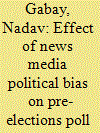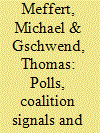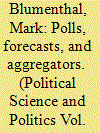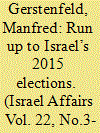| Srl | Item |
| 1 |
ID:
187566


|
|
|
|
|
| Summary/Abstract |
Research has had very little to say about whether polling predictions of elections outcomes are biased in line with the political bias of the news outlets that commission the polls. This article examines the relationship between news media political bias and bias in the published results of media-sponsored pre-elections polls in the three Israeli elections that took place in 2019–20. Given that these elections were largely referenda on Benjamin Netanyahu’s corruption charges – dividing the political system, the media, and the Israeli public into pro-Netanyahu and anti-Netanyahu camps – media political biases are narrowly defined in accordance with news outlets’ general attitudes to the charges. Thus, polling bias is defined as a systematic overestimate or underestimate of the number of parliamentary seats that the bloc of pro-Netanyahu parties will actually receive. It is found that, on average, polls commissioned by anti-Netanyahu media consistently underestimated the number of seats that the pro-Netanyahu bloc would win.
|
|
|
|
|
|
|
|
|
|
|
|
|
|
|
|
| 2 |
ID:
149328


|
|
|
| 3 |
ID:
139693


|
|
|
| 4 |
ID:
105706


|
|
|
|
|
| Publication |
2011.
|
| Summary/Abstract |
Polls and coalition signals can help strategic voters in multiparty systems with proportional representation and coalition governments to optimise their vote decision. Using a laboratory experiment embedded in two real election campaigns, this study focuses on voters' attention to and perception of polls and coalition signals. The manipulation of polls and coalition signals allows a causal test of their influence on strategic voting in a realistic environment. The findings suggest that active information acquisition to form fairly accurate perceptions of election outcomes can compensate for the advantage of high political sophistication. The theory of strategic voting is supported by the evidence, but only for a small number of voters. Most insincere vote decisions are explained by other factors. Thus, the common practice to consider all insincere voters as strategic is misleading.
|
|
|
|
|
|
|
|
|
|
|
|
|
|
|
|
| 5 |
ID:
131650


|
|
|
| 6 |
ID:
149183


|
|
|
|
|
| Summary/Abstract |
The 19th Knesset dissolved itself on 8 December 2014. New elections were set for 17 March 2015. Polls taken immediately after the dissolution of the Knesset showed major public disaffection with Netanyahu. Yet in polls on hypothetical run-offs against other party leaders, Netanyahu was seen to win in all cases. Labour and Hatnuah ran together. So did four Arab parties. A new party, Kulanu, led by Moshe Kahlon, joined the contenders. Several parties held primaries. In the campaign, online videos played an increasingly important role. Polls during the final days and exit polls turned out to be unreliable. The Likud became the largest party in the 20th Knesset with 30 seats.
|
|
|
|
|
|
|
|
|
|
|
|
|
|
|
|